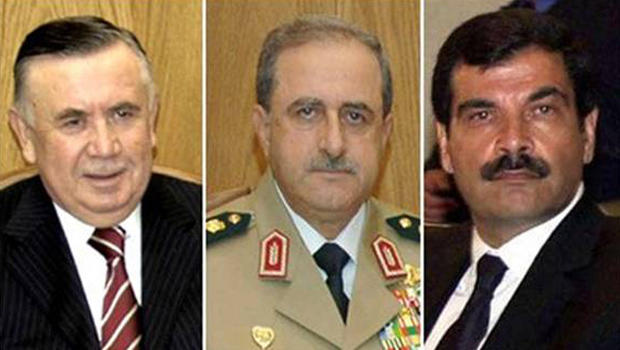Syrian rebels emboldened after assassinations
An audacious assassination has blown apart the inner circle of family and enforcers that has kept the Syrian dictatorship in power during a 17-month rebellion.
As of Wednesday evening, there are street battles in the capital. The U.S. defense secretary says Syria is spinning out of control.
It was a bomb, planted inside the daily meeting of president Bashar al-Assad's security chiefs.
Three are known dead, including Defense Minister Daoud Rajha; Asef Shawkat, the president's brother-in-law and feared former head of military intelligence; and Hassan Turkmani, a former minister of defense. Others were wounded, most importantly the head of the dictatorship's secret police.
Top Syrian ministers killed in explosionSyran opposition warns Assad's backers
Jordan aims to ward off Syrian chemical attack
Complete coverage: The Arab Spring
CBS News correspondent Elizabeth Palmer reports that after a year-and-a-half of slowly escalating conflict, Wednesday's bombing is the first time the Syrian regime has suffered a truly crushing blow. A funeral for an opposition activist outside Damascus turned to celebration when mourners learned the defense minister was dead.
Across the country in this savage civil war activists celebrated Wednesday's terrorist bombing because it struck at a hated elite inside the Syrian regime. The dead men were - like everyone in the room - masterminding the plan to crush Syria's uprising.
They were meeting in the National Security Headquarters near Damascus city center. Even though fighting has been uncomfortably close these past four days, it still should have been one of the safest buildings in the country.
The armed opposition, the Free Syrian Army, have claimed responsibility for the bombing. Syria's information minister blamed Arab and Western governments. Their intelligence agencies and spies are responsible, he said.
However, a Syrian official told CBS News the government is horrified at how easily the bomber appears to have entered the building.
Almost immediately after the blast, the regime appointed a new defense minister, and, for the first time, state television broadcast pictures, meant to reassure the public, of Syrian soldiers fighting in the capital.
On the one hand, they show the troops haven't deserted their posts. On the other hand, they're proof that the opposition offensive has come to the very heart of the Syrian capital.
Right afterwards everybody wondered where Assad had been. Then the Syrian news agency made a point of saying he had appointed the defense minister. In other words, he's alive but hasn't been seen. Wherever he is tonight, he must be wondering after this lethal breach of security who, if anyone, he can trust.
CBS News correspondent Clarissa Ward reports that people near the Turkish border erupted into cheers when they heard the news of the bombing. The Free Syrian Army is touting this as a major triumph and the beginning of the end for the Assad regime. (Click player at left for Ward's full report)
The main rebel fighting force started as a trickle of Syrian Army soldiers who refused orders to fire on civilians. They deserted to form the Free Syrian Army. Within months, there were dozens of groups across the country, but with no clear coordination or command structure.
In February CBS News spent time with rebel fighters in Idlib, a hotbed of resistance in the north. Most of the fighters were farmers and workers with little military training.
They said they had no choice. They had to fight after government forces shot peaceful protesters. Their weapons were no match for the army's tanks and artillery. Even bullets were scarce.
Now, 17 months later, the fighters appear to be better organized and trained. Rebels told us they confiscated many of their weapons from government forces, or bought them on the black market. An opposition video appears to show Free Syrian Army soldiers operating a tank commandeered from the Syrian military, but this is an exception. The rebels have relied mostly on homemade roadside bombs to pierce the military's heavy armor.
Talking to rebels on the ground, it's clear there is still no centralized chain of command or coordination among the various groups. One major concern is that because of that, extremists are making their way into the Syria vacuum, claiming to act on behalf of the opposition and already further muddy a deeply complex situation.
